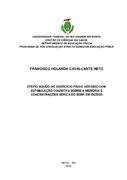Please use this identifier to cite or link to this item:
https://repositorio.ufrn.br/handle/123456789/21520| Title: | Efeito agudo do exercício físico aeróbio com estimulação cognitiva sobre a memória e concentrações sérica do BDNF em idosos |
| Other Titles: | Acute effect of aerobic exercise with cognitive stimulation on memory and serum BDNF concentration in the elderly |
| Authors: | Cavalcante Neto, Francisco Holanda |
| Advisor: | Barros, Jonatas de França |
| Keywords: | Exercício aeróbio;Estimulação cognitiva;Plasticidade cognitiva;Envelhecimento |
| Issue Date: | 17-Jun-2016 |
| Citation: | CAVALCANTE NETO, Francisco Holanda. Efeito agudo do exercício físico aeróbio com estimulação cognitiva sobre a memória e concentrações sérica do BDNF em idosos. 2016. 34f. Dissertação (Mestrado em Educação Física) - Centro de Ciências da Saúde, Universidade Federal do Rio Grande do Norte, Natal, 2016. |
| Portuguese Abstract: | Há evidências de que o exercício físico pode diminuir a perda cognitiva e prevenir a demência em idosos, assim também como o treino cognitivo é outra intervenção que vem sendo investigada, representando o aprendizado de novas formas de resolução de problemas, no entanto os estudos que investiguem o exercício físico aliado à estimulação cognitiva, ainda são inconclusivos. Objetivo: Analisar o efeito de uma sessão de exercício físico aeróbio com estimulação cognitiva no desempenho da memória e no aumento do fator neurotrófico derivado do cérebro (BDNF) em idosos. Material e Métodos: O presente estudo se caracteriza como quase experimental, com delineamento crossover randomizado. Tivemos como amostra 30 idosos de ambos os sexos (69,3 ± 5,8 anos de idade; 29,7 ± 3,9 kg.cm-²), que foram submetidos a três diferentes sessões, sendo duas de exercício físico (sessão com exercícios automática e sessão com estímulos cognitivos) e uma sessão controle, cada sessão teve duração de 50 minutos. A memória foi avaliada com o teste de lista de palavras, realizou-se também uma coleta sanguínea antes e após cada sessão a fim de avaliar a variação da quantidade sérica do BDNF. Após a coleta foi verificado a normalidade e homogeneidade das variâncias. Utilizou-se ANOVA two-way de medidas repetidas para comparação entre e intrasessões das concentrações de BDNF e memória. Adotou-se como nível de significância estatística o p < 5%. Resultados: Na memória, as sessões não foram diferentes entre si, no entanto, houve um efeito significativo no tempo, apontando que houve diminuição significante no desempenho de memória em todas as sessões. Nos níveis de concentração do BDNF, as sessões não foram diferentes entre si, do mesmo modo, não houve significância na interação tempo × sessão. Conclusão: Uma única sessão de exercício aeróbio conjugada a estimulação cognitiva com intensidade moderada não é suficiente para aumentar o fator neurotrófico derivado do cérebro, podendo prejudicar o desempenho da memória em tarefas realizadas logo após o exercício. |
| Abstract: | Human aging is characterized by different physiological and functional changes that may be influenced by lifestyle, genetic and environmental factors. Among the consequences of these changes are cognitive deficits, principally memory, affecting the activities of daily life of elderly. Cognitive training intervention combined with exercise has been widely indicated as an alternative to promote cognitive health, however, studies investigating exercise combined with cognitive stimulation are still rare and inconclusive. Objective: To determine the effects of the combination of single session aerobic exercise with cognitive stimulation over memory performance and increased Brain-Derived Neurotrophic Factor (BDNF) in the elderly. Methods: This study was characterized as almost experimental, with randomized and crossover design, fulfill with 30 elderly men and women (69.3 ± 5.8 years; 29.7 ± 3.9 kg.cm-²) who were subjected to three different sessions, including two sessions of physical exercise (one with automatic exercise and other with cognitive stimulation) and a control session, each session lasted 50 minutes. The memory was evaluated using the word list test, also serum BDNF was measured from blood sampling immediately before and immediately after each session. After the collection, was found normality and homogeneity of variances. We used two-way ANOVA to compare repeated measures both the concentration of BDNF and as the memory test between sessions and the session itself. We adopted as statistically significant level p <5%. Results: In relation to memory, the sessions were not different from each other (F (2, 89) = 0.36, P = 0.697, ᢀp = 0.008,), however, there was a significant effect in relation to time, indicating that there was a reduction of memory performance in post exercise in all sessions for both the short term memory (control – p = 0.002, automatic – p < 0.001 and exercise with stimulation – p = 0.023) and for work memory (automatic – p = 0.012 and exercise with stimulation – p = 0.015). In relation to the levels of concentration of BDNF, the sessions were not different each other (F (2, 90) = 0.06, P = 0.941, ᢀp = 0.001), in the same way, there was no significance in interaction time × session (F (2, 90) = 1.37, P = 0.260, ᢀp = 0.029) and in time (F (1, 90) = 0.14, P = 0.712, = 0.002 ᢀp). Conclusion: Moderate intensity aerobic exercise simultaneously with cognitive stimulation is not enough to increase the brain-derived neurotrophic factor, which may negatively affect the performance of memory in tasks performed soon after exercise |
| URI: | https://repositorio.ufrn.br/jspui/handle/123456789/21520 |
| Appears in Collections: | PPGEF - Mestrado em Educação Física |
Files in This Item:
| File | Description | Size | Format | |
|---|---|---|---|---|
| FranciscoHolandaCavalcanteNeto_DISSERT.pdf | 2,32 MB | Adobe PDF |  View/Open |
Items in DSpace are protected by copyright, with all rights reserved, unless otherwise indicated.

